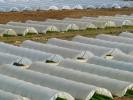Erasmus+ Project: Bringing biodiversity closer to the primary sector: nature helps us
- Type Project
- Status Filled
- Execution 2021 -2023
- Assigned Budget 137.807,00 €
- Scope Europeo
- Autonomous community Madrid, Comunidad de
- Main source of financing Erasmus +
In Europe, agriculture and the agri-food industry represent 6% of GDP, 15 million businesses, and 46 million jobs. More than 77% of the EU's territory is considered rural, home to approximately half of the population. The current crises highlight the urgent need for action to halt biodiversity loss, mitigate climate change, and promote food security.
The EU, within the framework of the International Convention on Biological Diversity, adopted an ambitious strategy to halt the loss of biodiversity and ecosystem services by 2030. It identifies actions where progress has not been made: "Increasing the contribution of agriculture to maintaining and enhancing biodiversity" and "Ensuring the sustainable use of fisheries resources and achieving good environmental status." Nat-Helpers plans to improve the training of professionals in the primary sector to ensure their full development in current and future situations (associated with the effects of biodiversity loss and climate change), promoting preventive work in socio-educational action for adults to improve their well-being in rural areas, and supporting the European environmental strategy.
The innovative nature of the project has led to the creation of various databases, shared among the different partners, to compile information on intellectual products. In addition, perception surveys have been developed for the sector; 36 fact sheets have been prepared on wild species with a negative perception but that are actually beneficial; 17 video interviews with farmers (of different types of crops, livestock farmers, and fishermen) have been recorded; and, finally, a guide for educators has been developed that facilitates access to previous results, as well as to resources on biodiversity, the European Biodiversity Strategy and climate change, the coexistence between the primary sector and biodiversity, and the marketing possibilities of these high ecological value products. The project has also included dissemination activities and multiplier events that have allowed it to reach much further. To develop all these activities, constant communication has been maintained between the partners through transnational meetings.
NAT-Helpers is a project focused on the Mediterranean region (Greece, France, Italy, Malta, and Spain) that promotes creativity linked to the primary sector, creating training tools that strengthen it and improving its production and, consequently, the marketing of its products (based on environmental improvements to position itself in the market). The project seeks to stimulate creativity in adult education through non-formal training for farmers and fishermen to contribute to the achievement of objectives 3 and 4 of the European Biodiversity Strategy 2030 and the objectives of European agriculture and fisheries policies. NAT-Helpers aims to facilitate training in the primary sector by providing examples of sustainable practices that allow them to obtain quality, high-value products on the market. It also contributes to the implementation of European policies on education, agriculture, fisheries, and biodiversity. Furthermore, it seeks to strengthen partner organizations and promote the exchange of knowledge and experiences to create training tools that integrate the diversity of participating countries.
IO3 - Tools for addressing biodiversity perceptions in rural culture and society. Adapted to address misconceptions about biodiversity: A set of 36 online fact sheets on biodiversity from a cultural, economic, and social perspective for rural areas. (https://seo.org/nat-helpers_fichas/)
IO4 - NAT-Helpers educational videos on good practices (benefits of the primary sector working with biodiversity in agriculture, livestock, and fisheries). A collection of 17 videos as an audiovisual tool for peer-to-peer knowledge transfer in an engaging and flexible manner, which aims to ensure follow-up by the target audience. This is an innovative educational resource for trainers, complementing their teaching. (https://seo.org/videos/)
IO5 - NAT-Helpers Methodological Guide for Educators (Concepts and Design Guidelines). This guide is for trainers and organizations working with the sector. It contributes to a broader understanding of the interaction of biodiversity with agriculture, livestock, and fisheries, and facilitates access to the other IO3 and IO4 outcomes, as well as many other resources. (https://seo.org/nat-helpers_guia/)
- Coordinator/entity name: SPANISH ORNITHOLOGY SOCIETY SEO
- Postal address: Calle Melquiades Biencinto 34, 28053 Madrid
- Telephone: 914340910
- Sociedad Española De Ornitologia Seo
- BirdLife Malta
- Sociedad Helénica de Ornitología
- Lipu - Liga Italiana para la Protección de las Aves
- LPO







